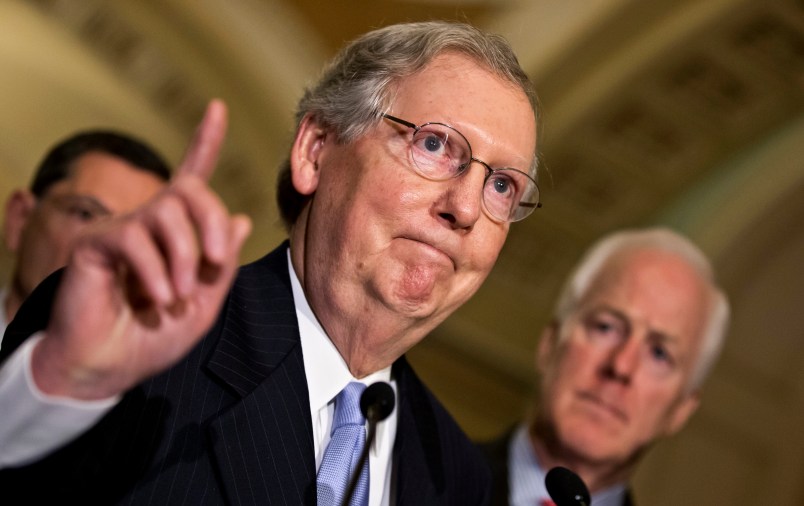Facing the very real possibility of a GOP-controlled Senate in 2015, health industry insiders are working up a wish list — the changes they’d like made to the Affordable Care Act under a fully Republican Congress.
But they’re also a little unsettled by the prospect of GOP control in Congress: Nobody is sure what exactly the Republicans would do if they had the opportunity to legislate however it wanted on the health care reform law.
It’s plausible that Republicans would simply continue their absolutist opposition to President Barack Obama’s signature legislation, especially if they view capturing the Senate as a vindication of their anti-Obamacare messaging. In that scenario, expect more symbolic repeal votes that the House has taken over the last few years. That would force Obama to pull out his veto pen again and again to defend the law.
The GOP’s absolutist position would also keep the health insurance industry nervously on edge. Disruptive legislative actions like repealing the individual mandate or cutting funding for tax subsidies would be worrisome for companies that have spent four years adjusting to and investing in Obamacare’s new reality.

But there’s another route Republicans could take: foregoing broad offensives in favor of more targeted strikes that might be harder for the White House to reject.
It’s telling that the industry isn’t yet sure which course a GOP-controlled Congress would choose. But if Republicans do decide to legislate in a more restrained fashion, the health insurance industry is expected to be the biggest player because, once repeal is off the table, they have the biggest beef with Obamacare of all the special interest groups.
“I think the health plans would be most ready to spring into action if the Republicans did well,” Caroline Pearson, vice president at Avalere Health, an independent consulting firm, told TPM. “They have more they’re disgruntled with right now that the Republicans are conceptually open to.”
The most obvious repeal targets would be the law’s health insurance tax and Medicare Advantage cuts. The industry has been railing against both for a while now.
A bill repealing the health insurance tax, an annual fee assessed on health insurance policies, was introduced last March and attracted 26 Republican co-sponsors — including two key members: Sens. Lamar Alexander (TN) and Orrin Hatch (UT), heirs apparent to the committees with jurisdiction on health policy.
The insurance industry is also vehemently opposed to the cuts to Medicare Advantage, private Medicare plans that include additional benefits, warning that they could lead to premium increases and reductions in benefits. And when the administration finalized those cuts in February, Alexander and Hatch spoke out against them.
A Senate GOP aide confirmed to TPM that repeals of the health insurance tax and Medicare Advantage cuts would be up for discussion next year if they held the gavel. Industry lobbyists and Senate staff have already begun some informal discussions about what the 2015 agenda could look like.
“We’re constantly in touch with those guys. A number of ideas have been put on the table over the last several years,” the aide said. “Some of them are farther along than others, but those conversations have certainly taken place.”
Another potential industry ask, which has mostly flown under the radar so far, would be the introduction of a cheaper insurance plan, known as a “copper” plan, which could be sold on HealthCare.gov and the state exchanges. The cheapest plan currently available, the so-called “bronze” plan, pays 60 percent of medical costs, while a copper plan would cover 50 percent. The more expensive “silver” plan covers 70 percent of costs, the “gold” plan covers 80 percent, and the “platinum” plan covers 90 percent. The “copper” plan could appeal to the young and healthy people who are key to the law’s actuarial success.
A “copper plan” bill was introduced last year by Sen. Mark Begich (D-AK), a vulnerable Democrat facing a tough re-election bid in a red state, but hasn’t been touched since. Republicans might need to be sold on it — they’d prefer an even more laissez-faire approach to the marketplace — but there could be room for compromise.

Joel White, a former Hill staffer who is overseeing the Council for Affordable Health Coverage, an industry-backed group pushing the concept, told TPM that his staff has talked with GOP Senate offices about getting a “copper plan” bill moved next year. They don’t seem to expect anything to happen this year.
“A lot of this has been subject to the even-number-year politics,” White said. “We’re working with House and Senate Republicans, but it’s just a tough year this year politically, so we recognize that this may be a laying-the-groundwork type year.”
The real question, of course, is how the White House would react to all this legislating. Theories differ: Avalere’s Pearson said that signing any changes to Obamacare into law could be opening a dangerous door from the administration’s point of view by emboldening Republicans to make bigger alterations.
But others think that if the White House can stomach some of these GOP-approved changes, they might seize the opportunity. Among them is Joel Ario, a former Obama administration health official who now consults with insurers and other groups at Manatt, Phelps and Phillips. That way, they could argue that they’ve achieved some real Republican buy-in on the law, which might soften its potency as a political weapon.
“Nobody can actually, plausibly assert that the law is going to work well in the next five years without any changes,” Ario said. “No matter which way the 2014 elections go, it’s not going to be decisive enough to either put the law across the finish line for good for everybody, or undermine the law to the point where it goes away. It’s going to be a long, hard slog.”






